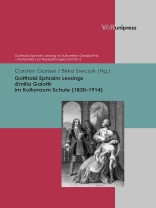Gotthold Ephraim Lessing has been a special part of German cultural memory since the beginning of the 19th century. This was only possible because it was ensured that his literary estate was preserved and cared for. In Lessing’s case, it was schools especially which played a salient role in the enthronement of the poet in the German canon and thus in Germany’s cultural memory. The role of the classical grammar school in this process has only sporadically been documented until now.This volume comprises edited contributions on Lessing’s ‘Emilia Galotti’. They offer an insight into the reception of this play between 1838 and 1904 and enable us to draw conclusions on relations between grammar school and university. The main focus of the volume is on school curricular programmes, which have hitherto received little attention by literary scholars.
About the author
Birka Siwczyk studierte nach einer Buchhändlerausbildung Germanistik, Kunstgeschichte und Pädagogik (Lehramt). Sie ist als wissenschaftliche Mitarbeiterin an der Arbeitsstelle für Lessing-Rezeption Kamenz tätig.












